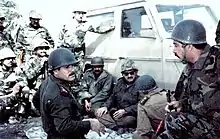Wafiq al-Samarrai
Wafiq Jasim Ablaj al-Samarrai (born 1 July 1947) is an Iraqi general formerly chief of Iraqi general military intelligence born in the region of Samarra.
Wafiq Jasim Ablaj al-Samarrai | |
|---|---|
 Samarrai (center left) during the Iran Iraq War. | |
| National Security Adviser | |
| In office 2005–2008 | |
| President | Jalal Talabani |
| Director of General Military Intelligence | |
| In office 1990–1991 | |
| President | Saddam Hussein |
| Personal details | |
| Born | July 1, 1947 Samarra, Iraq |
| Military service | |
| Allegiance |
|
| Branch/service | Iraqi Army |
| Battles/wars | Iran–Iraq War |
Military career
Al-Samarrai served as the deputy of the Military Intelligence Director in 1988 during the Anfal Genocide,[1] in the Iraqi Intelligence during the Iran–Iraq War and was appointed head of Military Intelligence Agency in 1990.[2]
Defection
He defected in December 1994 and drove up to Kirkuk, then walked for 30 hours to cross the frontier into the Northern Kurdish enclave. At first he allied himself with Ahmad Chalabi, the leader of the Iraqi National Congress. They fomented a mini war in March 1995 between Kurdish groups and the Iraqi Army that went wrong when the insurgents failed to secure American military air support. Al-Samarrai moved to Syria and eventually made his way to London in 1998, where he headed an opposition group called the Higher Council for National Salvation which is based in Denmark.
Following his defection, Qusay Hussein told senior Iraqi officials, including Ra'ad al-Hamdani, that al-Samarrai had been an undercover agent for Jalal Talabani and Iran since 1982.[2] Former Maj. Gen. Mizher Rashid al-Tarfa al-Ubaydi of Iraqi Intelligence claimed that al-Samarrai fled because he believed he was about to be arrested.[3]
Post invasion of Iraq
In 2003, he returned to his hometown Samarra, Iraq and remained there until he was appointed as the national security advisor to President Jalal Talabani in 2005 and moved to the Green Zone in Baghdad. He was relieved of his post in 2008 after the discovery of documents implicating him in the Iraqi forces' operations against rebels in the 1991 uprisings.[4]
On March 6, 2008, the Iraqi presidency website publicized a judicial decision to lift off all restrictions imposed on General Wafiq al-Samarrai, including a freeze on his assets, after Supreme Criminal Court Judge Adnan Al Badri reportedly announced that a probe found no evidence to implicating al-Samarrai in 1991 Iraqi Army attacks on Kurds and Shia.
However, Samarrai left for London and announced that he will not return to Iraq in the future.[4]
References
- Hardi, Choman (2011). Gendered Experiences of Genocide: Anfal Survivors in Kurdistan-Iraq. Ahgate. pp. 20. ISBN 978-0754677154.
- Woods, Kevin M. (2009). Saddam's War: An Iraqi Military Perspective of the Iran-Iraq War. Washington, D.C.: Institute for National Strategic Studies, National Defence University. p. 72. ISSN 1071-7552.
- Woods, Kevin M. (2011) [2010]. Saddam's Generals: Perspectives of the Iran-Iraq War. 4850 Mark Center Drive, Alexandria, Virginia: Institute for Defense Analyses. p. 101.CS1 maint: location (link)
- "وفيق السامرائي" (in Arabic). Al Jazeera.